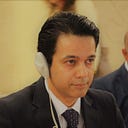Under Qaboos, Oman Rejected Extremism, Embraced Internationalism. How Did He Do It?
One of the greats of the region, the longest serving leader in the Arab world, Sultan Qaboos bin Saeed bin Taimur Al Saeed, 79, passed away today morning.
Immediately, Kingdom of Bahrain, in the Gulf, announced three days of mourning and lowered its flag at half-mast. All Gulf states will follow.
There was no instability after the news. Oman is stable after Qaboos: within hours, the new Sultan Haitham bin Tariq Al Saeed took oath as the new sovereign of the Sultanate. [Video clip of the new Sultan taking oath of office: https://t.co/wmbHbTI2gk ]
Oman is the first country in the region to send an ambassador to Washington, in 1841. It maintains close ties to the United Kingdom, Israel, and Iran. Oman played an important role within the world’s second largest multilateral organization, the OIC, by working quietly with Israel on maintaining and preserving Muslim sites in Jerusalem. In doing so, Oman coordinated with Morocco and Jordan, who exerted similar effort.
Oman is an example of religious tolerance and moderation: majority Omanis follow the Ibadi sect, and it is the only Muslim country with this sect followers in majority. Sunni and Shia Muslims are flourishing minorities, and Jews have also lived in Oman. But under Sultan Qaboos, Oman practiced religious tolerance and acceptance of others while remaining proud of conservative Arab values.
Under late Sultan Qaboos, Oman trained its citizens to be religious moderates, avoid extremism and violence, and reject attempts to weaponize sects and religions. Muscat often holds events inviting representatives of all Islam sects and world religions. If you visit Oman, you will find it very Arab and Muslim but also open to foreign cultures and welcoming of westerners. Tourism sites are in abundance, alcohol consumption for Omanis and foreigners is not banned. It even has a Royal Oman Symphony Orchestra and a world-class opera house.
Under Qaboos, Oman prevented Sunni extremism and militancy from entering the country, including from nearby fellow allies. And despite close ties to Iran [it helped mediate the Iran nuclear deal with the West in the early phases of the negotiations], Muscat prevented the spread of Khomeinism, the extremist and militant form of Shia Islam at a time when Iran’s IRGC and Quds Force was operating in the entire region. How Oman managed this is a testament to the shrewdness of Sultan Qaboos.
The militaries of Oman, America, Pakistan, and the United Kingdom have partnered in recent months to increase security in northern Arabian Sea leading up to the strait of Hormuz, a vital world energy maritime route. Omani citizens of Pakistani Baloch descent play key roles in Omani armed forces, though most of them have never been Pakistani citizens.
A key reason for Oman’s vibrant foreign policy and openness to relations with world nations is its seafaring tradition. Omani traders have settled down in many countries and you can find Omani communities even today in China, Indonesia, Malaysia, India, and several Asian and African nations. And these communities have maintained ties to their motherland.
It is widely expected that Sultan Qaboos made arrangements for a smooth power transition in the sultanate. He was receiving treatment for cancer for several years.
